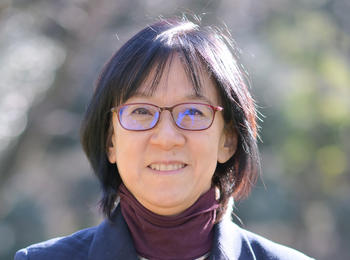Prof. Dr. Yoko Tanaka
Yoko Tanaka is professor emeritus in socio-economic history and comparative labor studies in University of Tsukuba, Japan. She received her B.A. and Ph.D. from the Department of Economics at University of Tokyo. Her dissertation on the business and labor history of Krupp Co. before WW1 in Germany, based on archive works in years, was awarded a prize by the Japan Association for Social Policy Studies, and the Okinaga Prize in 2002/2003. Later she became engaged in the comparative studies on contemporary labor relations in Germany and Japan, along with the historical studies, including the joint research with WZB in Berlin.
She was the president of Japan Association for Social Policy Studies from 2012 to 2014, as well as the editor-in-chief of Journal of German Studies, and of Journal of International Japanese Studies. She was invited as research fellow of re:work, International Research Center for Work and Human Lifecycle in Global History in Humboldt University Berlin from 2015 to 2016. From 2017 to 2018, as invited visiting scholar in Harvard Yenching Institute in the U.S., she explored the long-term structural change of work in corporations in the international perspective.
She has been professor in University of Tsukuba since 2008 until March 2024. From April 2024, she is professor emeritus at the same university, and visiting researcher of Ohara Institute for Social Research as well as Friedrich-Meinecke-Institute. She is leading the Essential Worker Research Network in Japan.
During the industrialization of the 19th and 20th centuries, manufacturing industry developed significantly and competitive companies emerged in Germany and Japan. As manufacturing became based on full-time male labor, the male breadwinner model took root in both countries after World War II.
Technological innovation led to a decrease in the manufacturing workforce, while the proportion of the service industry increased. Consequently, also driven by digitalization and neoliberalism, the number of non-full-time, non-regular employment positions, particularly among female workers, increased in both countries. Since the 1990s, the composition of employment in these countries has changed significantly.
However, despite this similar transformation, the employment conditions in Germany and Japan have evolved in completely different ways. While Germany has made progress in flexibilizing working hours, Japan has seen a rise in precarious employment. In particular, about half of the young people who graduated during the 2000s and 2010s, a period known as the "employment ice age," failed to secure regular employees. In Japan, full-time regular work often demands such long working hours that it becomes difficult for women to continue working after having children. As a result, many women are forced to quit or accept non-regular employment with extremely poor working conditions.
This study compares Japan and Germany to analyze why the working conditions in two countries have diverged so greatly, despite their similar backgrounds, and why Japan, in particular, has become a society in which many people find it difficult to work.
Selected Articles in English
Yoko Tanaka 2023,‘Tumbling Down the Standard Life Course: The Ice Age Generation of the Turn of the Twentieth Century and the Origins of Polarisation in Japan’, in: Josef Ehmer & Carola Lenz (eds.), Life Course, Work, and Labour in Global History, De Gruyter
Yoko Tanaka 2020, ‘State Dysfunction in a ‘Fortunate’ Japan’, in: Andreas Eckert & Felicitas Hentschke (eds.), Corona and Work around the Globe (Work in Global and Historical Perspective Book 11) , De Gruyter
Yoko Tanaka 2019, ‘End of the Housewife Paradigm? The Comparative Development of Work-Family Models in Germany and Japan’, in: Uta Meier-Graewe, Miyoko Motozawa & Annette Schad-Seifert (eds.), Family Life in Japan and Germany. Challenges for a Gender-Sensitive Family Policy, Springer, pp.219-265
Yoko Tanaka 2004, ‘Between Self-responsibility and Social Security. Japan and the European Social Model from a Historical Perspective,’in: Hartmut Kaelble & Günther Schmid(Hg.), Das europäische Sozialmodel. Auf dem Weg zum transnationalen Sozialstaat. Wissenschaftszentrum Berlin WZB Jahrbuch 2004, Berlin, sigma, S.167-213
Selected Papers in International Conferences
Yoko Tanaka 2018,‘Precariousness in Workplaces. Comparative Study on Exclusion Line in Germany and Japan’ World Economic History Congress at Boston/Cambridge
Yoko Tanaka & Osamu Saito 2018, ’Competitiveness and Technological Innovation in Manufacturing Industries in Germany and Japan from Historical Perspective’, World Economic History Congress
Yoko Tanaka 2018,‘Structural change of female labor participation in Germany 1875- 2015’, World Economic History Congress
Yoko Tanaka 2018, ‘Historical Transition of Insider-Outsider Structure in German Corporate Governance’, Gesellschaft für Unternehmensgeschichte +Business History Society of Japan in Frankfurt
Yoko Tanaka 2017,’Gender Inequality in Growing Service Economy? Non-Standard Work in Germany and Japan’Japanese-German Center Berlin [JDZB] +Japan Society for the Promotion of Science [JSPS], Colloquium on Equal Participation and Diversity in Berlin
Yoko Tanaka 2016,‘From Small Family Business into Big Business with Non-Regular Workers? Historical Development of Retail Stores in Germany’, World Congress on Business History in Bergen






